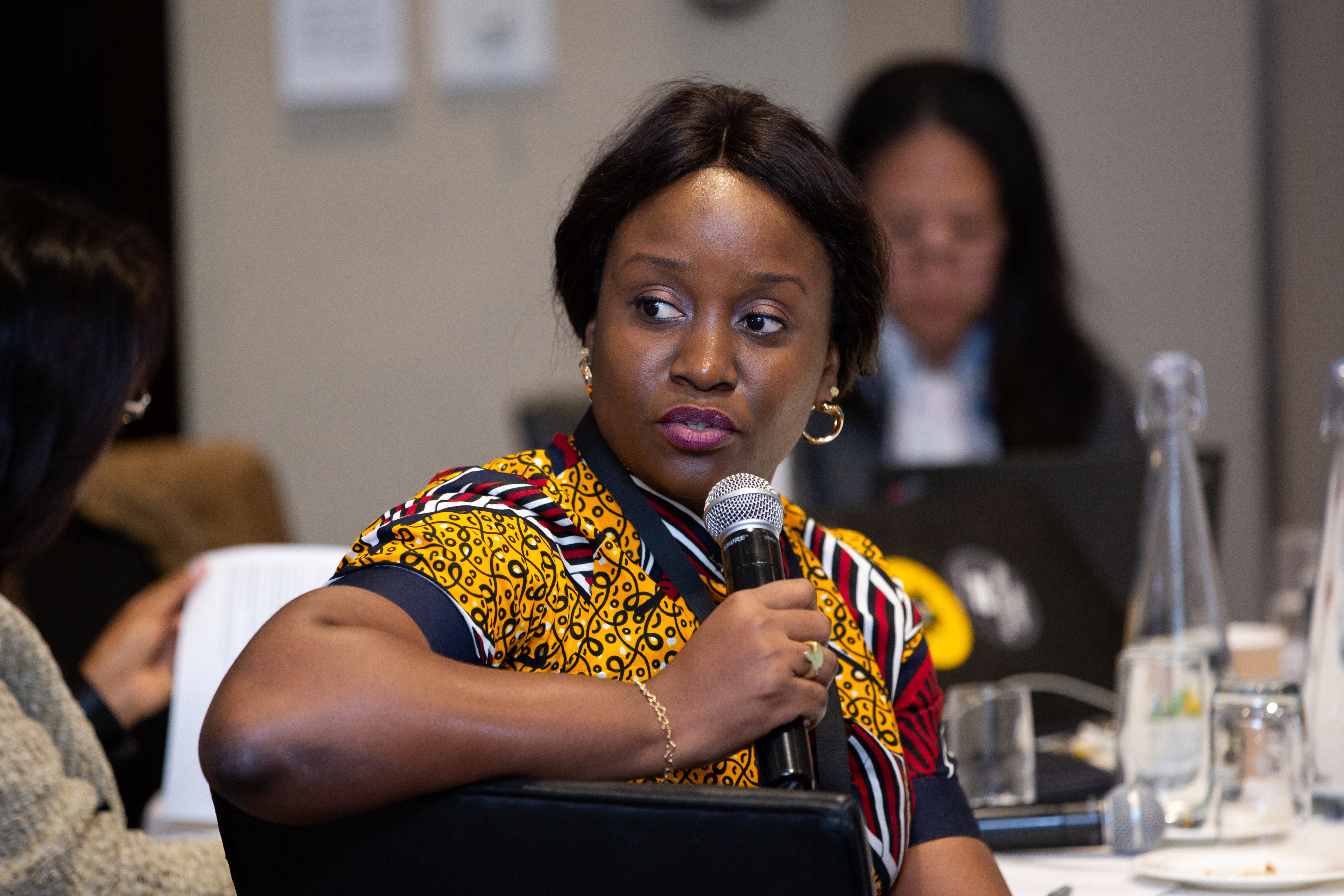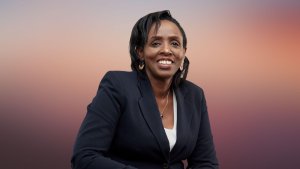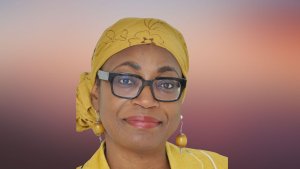Chioma Agwuegbo of TechHer Nigeria, talks to Folashadé Soulé and Herbert Mba Aki about how the pandemic is impacting young people in Nigeria, especially young women, and how African youth are tackling the crisis.
Chioma Agwuegbo is the Executive Director at TechHer Nigeria, an organization demystifying technology for women and applying tech solutions towards societal problems, especially as they affect women. Her interests revolve around women, media, politics, and technology and her strategies advance causes, build businesses, and foster engagement between government and citizens. Chioma’s foray into advocacy began in 2008, with the Light Up Nigeria Movement. Since then, she has functioned in leadership teams for campaigns such as Enough is Enough, Gen Voices, Occupy Nigeria, Bring Back Our Girls, Not Too Young To Run, and now StateofEmergencyGBV. She is an alumnus of the World Economic Forum’s Global Shapers and served as Deputy Curator and Communications Director of the Abuja Hub.
In this interview, Chioma Agwuegbo discusses how the pandemic is impacting young people in Nigeria, especially young women, and how various innovative solutions set up by African youth and civil society organizations are helping to tackle the crisis.
From your experience as a youth leader and social activist in Nigeria - in your opinion, how do you assess Nigeria’s response to the pandemic, from government and citizen perspectives?
Chioma Agwuegbo: I would say, some people were slow to believe that we could be affected by the virus. At first, from December 2019, a lot of countries around the world thought it was a Wuhan issue, then it was a Chinese issue - and then it was an Asian issue and it wasn’t going to get to Europe and it wasn’t going to come to Africa. As a matter of fact, up till about the middle or even the end of January, there was rhetoric on the continent saying the coronavirus was not going to affect black people. And so there was a lot of laxity, also in Nigeria. By the time we got our first case, I believe at the end of February, a lot of communication damage had been done. And again, you have to think about the education and literacy levels of the people across the country and how diverse the country is.
First of all, the narratives across the country were a mess. In the Eastern part of Nigeria, the rhetoric was: “the Nigerian government is trying to impoverish the East”. And then in the North with the country’s largest congregation of Muslims, the rhetoric was: “we don’t care about this because Allah gives and Allah takes, right? If a person dies, this is just their time”. And then in other parts of the country, you had rhetoric saying: “I am already poor, I’m already hungry. I’m already without a job. This is not something I want to be bothered about: it’s white man’s sickness.” And in my opinion, the communication from the government could have been more strategic, taking these leanings into account.
But then, the response from some citizens to take personal responsibility has even been worse. I also think an exacerbated poor response was due to the amounts of money that were touted everywhere. Bill and Melinda Gates foundation gave X amount of million dollars, WHO or the other gave X amount of million dollars. And so again, the narrative with some citizens became: “politicians are just looking for another excuse to collect money”. I know that in Kano, there was a particular two-week period where over a thousand people died from strange causes. Verbal and visual autopsies had to be carried out on the dead to satisfy religious sensitivities, and the results were the deaths were consistent with Covid19 symptoms. How clearly and urgently was this communicated in that state and other states with similar strange deaths? My overall opinion would be that beyond the big cities, the government handled communication very poorly.
What the government has done, which was heavily criticized, was the way they shared ‘palliatives’, the way they shared money. They shared this money according to them to people who were vulnerable. One of the major criticisms they got was that they gave out cash. The pandemic is a call to limit human interaction, to take on things like mobile money, transfers, and generally reduce the handling of notes, which is a potential causative factor for people to pass on the virus. But in doing so, the government didn’t limit interaction. I remember the visual on television and even in the papers, there was a massive table with naira notes and the minister of humanitarian affairs; and then other photos of her passing these monies on the beneficiaries. Decked in a mask and gloves yes, but I thought, what were the subtle messages passed with this type of display?
Prices of goods and services have increased; food has become a lot more expensive. Transportation is a lot more expensive. The question then becomes, you give out money once in April, but what’s happened since then? Was this money supposed to take care of them during the entire period of the lockdown, or was there a plan to continue to give these people money? Because for instance, if you use equivalence: if a hundred dollars would typically last the family one month, because of the increases in transportation and food and everything, that $100 now lasts them half a month. So if you give them a hundred dollars in April, what happens to May? What happens to June? The country only started to ease lockdown in some areas in the middle of June and up till now, there are still some areas where we don’t have flights because the airports have not been open. So it’s had a massive effect on food, on the movement of food and the movement of goods. As a result, illegal routes to get to different states have opened up.
So for me, there was a major communication lapse in just telling people, this is what the virus is, this is how you can protect yourself. But this is also our response to the virus as a government, and here is how that response covers you.
In terms of responses of the government in the beginning of this crisis there were dual opinions about the pandemic in Africa on the one hand, some analysts were very optimistic saying Africa has an experience of dealing with pandemics, like Ebola, for example, and that this would play, as an advantage on the management of COVID-19. On the other hand, there was a part of the opinion saying because of the lack of health infrastructures and everything, we would not be able to handle the crisis. So far do you think there were lessons learned from Ebola, which can make the management of COVID-19, let’s say positive? Is the lack of infrastructure playing against the management of the current pandemic ?
Chioma Agwuegbo : That’s a big question. I would say that Nigeria managed Ebola very well. I think a lot of countries took lessons or learned lessons from Nigeria handling Ebola. I think that because our response, led by our heroine Dr Stella Adadevoh, was clear with messages saying: this is what to do; this is how you react to it: this is how we treat it. Very straightforward. But up till now Corona is still evolving. So if you’re going to look at the advisories that come from the World Health Organization: today, they say, wear masks - tomorrow they say, no, don’t wear masks except if you’re ill. Then today they say, go out, but tomorrow they say, don’t go out. They talk about herd immunity. Then they talk about not putting pressure on vulnerable people. It’s a lot of information to process in a period of uncertainty.
But I think that our Center for Disease Control (NCDC) headed by Dr Chikwe Ihekwazu has done tremendously well. Nigeria is a country of about 200 million people. We have over 300 ethnic groups and most of these ethnic groups have different languages. So working across people that are so diverse, people who are so divided across religious lines and cultural lines and political lines is tough. It’s tough. And I think that one must give credit where credit is due. So I think that they’ve handled the management of the virus in Nigeria very well. I also believe that funding is a big part. Nigeria’s health budget over the past five, six, maybe even 10 years has been consistently below the recommended percentages. So first of all, our healthcare is underfunded. For instance, if the minister of health de-prioritizes health, it means that the funding that will go to his ministry will be little.
While under the circumstances they have done tremendously well, the political will supporting the work that they do has been less than desirable. For instance, a government official died. The president’s chief of staff died and despite all of the advisories and despite all of the warnings about congregating from the NCDC, they had hundreds of people at his funeral, led by government officials. I keep saying if government models say one thing to citizens, they cannot ask them to do another thing. You can’t tell people not to congregate, not to appear at events without masks, not to travel and respect the interstate travel restrictions, et cetera, if you’re doing just that. So the political will hasn’t been great.
I also think that the inclusivity in the planning to respond to COVID-19 has not been great. And a good quick example of this is if you look at sexual and gender-based violence. I’m sure that you must have seen that the cases out of Nigeria have been a little overwhelming.
Sexual and gender-based violence wasn’t classified as an emergency. Yet, we were recording cases every single day, every single night. So when first responders go out to cater to families, for instance, to extricate a young girl who was sexually abused, they then get hurt, asked by security forces questions like: “why are you outside when the country is on lockdown?” And so despite several layers of advocacy, it still hasn’t been designated as an essential service. So as far as I’m concerned, I do not think that the response has been as holistic as it could have been, especially on the side of government and political will, but on the side of the technocrats and the NCDC, I think they’ve done an excellent job with what they have.
Which initiatives and innovation were set up by African youth and civil society organizations in response to the pandemic?
Chioma Agwuegbo: It was civil society who started creating messages in various languages. It was civil society and individuals who started making comedy: creating content with a comedic value for citizens to understand what coronavirus is about. For instance, I know a videographer who I work with who doesn’t even have a civil society organization. This is just a woman who runs a film business and she created video messaging in about six different languages. All she asked people to do was to share it with people in the villages, et cetera. I know about other organizations. For instance, TechHer worked with another organization called SilverChipFox, setting up a series of conversations for entrepreneurs and young people. As soon as we went into lock down, these conversations helped folks repurpose their businesses. So we talked about taking on more digital tools for working. We talked about force majeure (a common clause in contracts that essentially frees both parties from liability or obligation when an extraordinary event or circumstance beyond the control of the parties) and negotiating or renegotiating their contracts and grants agreements, etc.
And then we also talked about the mental effects of being in lockdown, the restriction of movement and all of those types of things. I know organizations who started holding wellness classes online. Instead of having people walk in for medical care, they started holding virtual conversations. But lots of the real work, a lot of the real impactful work has been led by young people. I know that, just a few days ago, the Abuja Global shapers community was working with a group in Hong Kong, and delivered over 1,500 masks to people working in the markets and in the motor parks. And then they had a lot of messaging for these people saying, this is how you keep yourself safe, here’s how to reduce your risk, etc. They’ve done a few other projects in this regard.
What has specifically been the role of TechHer, your organization, to address COVID-19 impacts on youth in Nigeria ?
Chioma Agwuegbo: One of the things that we did was that series on tools I mentioned on force majeure and in educating people on contracting, but then also on mental health and wellness. Now we’ve put together a 12 part series on upscaling women in the work that they’re doing. Under our Continuous Learning Development Program, we will be teaching digital marketing career growth and development, such as emailing and use of that to marketing financial management, adapting business models, digital tools, registration, and taxation. Basically, we’re teaching topics that we have taught before on different platforms. We’re bringing it now into some sort of arranged modules so that people can take advantage of them and sign up for things that really matter to them and their particular businesses.
We’re currently just receiving expressions of interest from some of the people who are going to be training for us on this project. I think the greatest drawback for me is that we’ve not been able to reach our children. We had reached about 700 children in four months last year. But because schools are not open anymore, we can’t reach these children. These children are very vulnerable, and they probably do not have electric power. There’s obviously no access to the internet. There’s literally no access to phones. But for the adults, we have a number of plans that are in progress on how we can engage them.
Finally, TechHer has coordinated some strategic responses for sexual and gender-based violence in Nigeria, culminating in the #StateOfEmergencyGBV campaign that’s advocating for a holistic response from our government on prevention and response to SGBV. The campaign is led by a number of organisations - TechHer, Girl Child Africa, Connected Development, Enough is Enough Nigeria, Stand To End Rape, SilverchipFox, Yiaga Africa, Dorothy Njemanze Foundation, and Education as a Vaccine. We’re grateful for the responses we’ve seen, but we’re anxious for so much more.
You started talking about the gendered impact of COVID-19 and you mentioned sexual based violence. How do you think that COVID-19 has affected young women across sectors in Nigeria?
Chioma Agwuegbo: Let’s start with education. Nigeria has the largest number of “out of school” children in the world with about 13.2 million and 60% of this number are young girls. At the same time, we have another 50 to 60 million receiving poor quality education. And I’ll give an example of that: TechHer runs a school tour, teaching children in local education authority schools about technology using playing cards. Now, a number of these schools do not have access to electricity. They do not have access to decent toilets. So there’s a sanitation issue there. The difference between them and children who are middle-class children or lower income children and not entirely vulnerable has been widened. Starting from education a lot more people are out of school, meaning that a lot of these people are locked in with their abusers.
A lot more people are being pawned off to pay debts or to settle scores. And that’s just from the education bit. If you look at the business, I think there’s research that shows that we have more women working in the informal sector than men. And this has to do with entrepreneurship and a lot of them, petty traders and lots of them, small businesses. Again, all of these shut down, with the restrictions imposed from the coronavirus. And people were unable to move their goods around.
Women are traditionally seen as dispensable because they’re going to get pregnant anyway, take leave and be out of work, and not be able to contribute as much as their male colleagues are doing. When the virus came along, a lot of them were taught to take leave without pay, et cetera. And there was nothing for people to fall back on. We’ve heard a number of reports about people taking increasingly to prostitution. And now solicitation in Nigeria is a crime. There is also the psychological effects of all of this: people with plans and dreams who have been affected. I’ve also heard of a number of cases, and this is by no means scientific because this is just people who have access to me, of women breaking down. Because the escape they have, which would be to drop the children off at school and then go to the workplace is gone and everything is now, you know, people are living at work.
What do you think the role of African youth organizations could be in tackling, and participating in the recovery response from COVID-19 in Africa, potentially in collaboration with the government?
Chioma Agwuegbo: I think that, to be honest, young people are doing enough. They’re doing so much. I’ve seen so many new businesses spring up. There are people now who run entire businesses, just going to the markets for others so that people can reduce their exposure to the virus. There are people who are holding online teaching sessions for children because the federal government and the ministry of education have instructed that schools should not hold online classes, but the reality is if they are not learning, what are they doing? So again, young people have now created new businesses, where they hold online classes. I know that my niece and my nephew are currently taking French classes, English classes, and science classes hosted by young people who have just been rendered unemployed from the pandemic. There are civil society organizations that are holding the government to account. For instance, the government wanted to pass something called the infectious diseases control bill. So civil society organisations stand up and say, you cannot pass a bill because there’s a pandemic without consulting Nigerians, you cannot use the excuse of a pandemic to foist restrictive, ill-thought out laws on people. I think that despite the hindrances and the obstacles that continue to plague them, whether from the virus or even from the government, young people are doing the best that they can. What we need at this point is a holistic plan from the government backed by sufficient political will to ease suffering. That’s all we need.
How could the government of Nigeria support those activities during this pandemic?
Chioma Agwuegbo: I think the first thing is to learn the lessons that can be implemented when we’ve gotten a handle on the virus. So TechHer hosted a series of conversations in collaboration with Mandipa Ndlovu called the Relaunching Africa Series, and we interviewed 21 Africans from 18 different African countries talking about how the continent can reimagine itself. One of the stories that we heard from South Africa was Tebogo Tsothela from the Gauteng Health Department and he talked about how the government worked to ensure that people were no more than five kilometers from the nearest testing centre, and created an app which they pushed very hard through campaigns and advertising, for citizens to assess themselves, see their risk to the virus, find a test centre, and then schedule to get physical tests done. This was also a platform for health workers to report to the central government when they started running out of PPEs or other equipment. All in all it is a very handy app for people to use. Contrast that with some states in Nigeria where doctors threatened to go on strike because they didn’t have enough PPEs. They said, “If you’re sending us to work without PPEs, you’re signing our death warrants, because we will go there, contract the virus, and die. There are a number of states losing health workers. So for me, the question is: what are the lessons that we can learn? How can we apply these lessons to the other areas where we might be falling short in the delivery of services and governance to our people?
The final thing I’m going to say about what our government can do is consultation. And this is consultation that doesn’t just tick a box of ‘yes, we’ve consulted’, but consultation that you know is truly reflective of the heartbeat of the people.
About the COVID-19 and Africa series: a series of conversations conducted by Dr. Folashadé Soulé and Dr. Camilla Toulmin with African/Africa-based economists and experts about their perspectives on economic transformation and how the COVID situation re-shapes the options and pathways for Africa’s development - in support of INET’s Commission on Global Economic Transformation (CGET)
Contact: [email protected]







